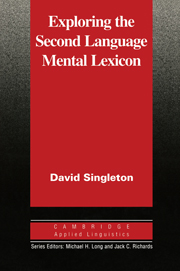Book contents
- Frontmatter
- Contents
- Series editors' preface
- Foreword
- Acknowledgements
- I INTRODUCTION AND PROLEGOMENA
- II RESEARCH REVIEW
- III EVIDENCE FROM THE TRINITY COLLEGE DUBLIN MODERN LANGUAGES RESEARCH PROJECT
- 5 The Trinity College Dublin Modern Languages Research Project in broad outline
- 6 Findings on form and meaning in the L2 mental lexicon
- 7 Findings on the cross-linguistic factor in lexical processing and acquisition
- 8 Findings on communication strategies
- IV CONCLUSION
8 - Findings on communication strategies
Published online by Cambridge University Press: 05 October 2012
- Frontmatter
- Contents
- Series editors' preface
- Foreword
- Acknowledgements
- I INTRODUCTION AND PROLEGOMENA
- II RESEARCH REVIEW
- III EVIDENCE FROM THE TRINITY COLLEGE DUBLIN MODERN LANGUAGES RESEARCH PROJECT
- 5 The Trinity College Dublin Modern Languages Research Project in broad outline
- 6 Findings on form and meaning in the L2 mental lexicon
- 7 Findings on the cross-linguistic factor in lexical processing and acquisition
- 8 Findings on communication strategies
- IV CONCLUSION
Summary
As has already been indicated, and as the discussion of communication strategies in Chapter 4 makes abundantly clear, some of the MLRP data discussed in the previous chapter in the context of crosslexical consultation could just as well have been discussed under the heading of communication strategies. All instances of subjects' responding to perceived lexical gaps or difficulties in language x by ‘borrowing’ elements from language y can be regarded as strategic, and we have seen not a few examples of such behaviour in the foregoing pages. However, our focus in the last chapter was on the evidence that such strategies provided of connections between the lexicon of the language being used and the lexicons of other languages known to the individual in question. This was, moreover, precisely the way in which these data were used in the early papers to emerge from the MLRP.
Our interest in other issues raised by communication strategies dates from the time when Jennifer Ridley joined the project. Ridley's own connections with strategy research began with some work she conducted outside of the MLRP for an M.Phil, dissertation (see Ridley, 1991a, 1991b). The (very welcome) additional dimension she brought to the MLRP was for the most part based on a continuation of her earlier research – in this case within the framework of a doctoral project (Ridley, 1994), now published in revised form (Ridley, 1997).
- Type
- Chapter
- Information
- Exploring the Second Language Mental Lexicon , pp. 251 - 266Publisher: Cambridge University PressPrint publication year: 1999



